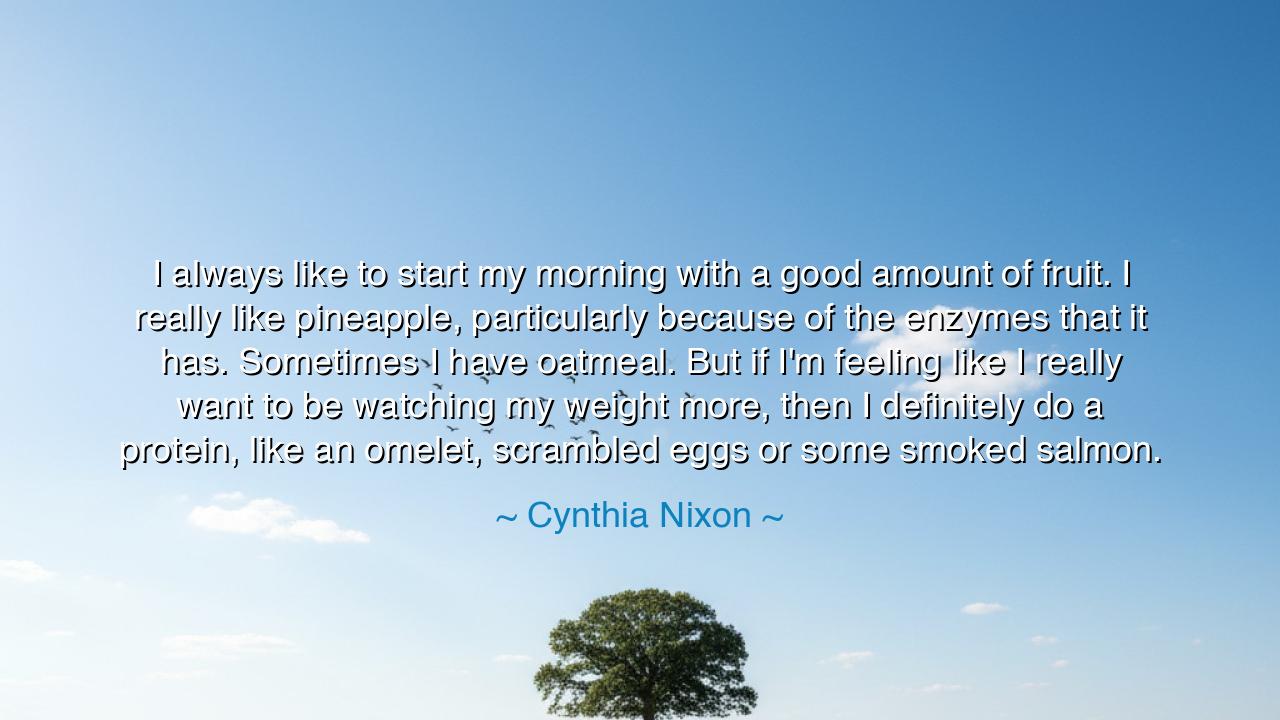
I always like to start my morning with a good amount of fruit. I
I always like to start my morning with a good amount of fruit. I really like pineapple, particularly because of the enzymes that it has. Sometimes I have oatmeal. But if I'm feeling like I really want to be watching my weight more, then I definitely do a protein, like an omelet, scrambled eggs or some smoked salmon.






"I always like to start my morning with a good amount of fruit. I really like pineapple, particularly because of the enzymes that it has. Sometimes I have oatmeal. But if I'm feeling like I really want to be watching my weight more, then I definitely do a protein, like an omelet, scrambled eggs or some smoked salmon." Thus spoke Cynthia Nixon, with the wisdom of one who has learned that the way we greet the dawn shapes the strength with which we face the day. Her words, though framed in the simple language of breakfast, conceal a truth of great depth: that discipline and intention, even in the smallest rituals, are the foundations of health, balance, and self-mastery.
To begin the morning with fruit is to align oneself with nature’s sweetness, to draw energy not from heaviness but from the living light of the earth. In choosing pineapple, she honors the fruit not only for its taste but for its hidden power, the enzymes that aid the body in its unseen labor of digestion. This is no casual indulgence, but a recognition that even food may be medicine, that the gifts of the earth are not mere pleasures but tools of strength. In this act we see the wisdom of the ancients, who understood that to eat with knowledge is to heal, and to heal is to live well.
She then turns to oatmeal, the humble grain that has sustained peasants and kings alike for centuries. Oats are steady, enduring, a food of patience and strength. To eat them is to clothe the body with slow-burning energy, to prepare not for a fleeting moment but for a day of endurance. Here Nixon’s words remind us that life requires both sweetness and steadiness, both fruit for freshness and grain for perseverance.
But when vigilance calls, she chooses protein—the omelet, the scrambled eggs, the smoked salmon. These are the foods of warriors, of travelers, of those who must guard not only against hunger but against excess. She reveals that even in eating there is strategy: at times to delight, at times to endure, at times to restrain. Just as the general adapts his tactics to the battlefield, so does the wise adapt their nourishment to the needs of the hour.
History offers parallels to this wisdom. Consider the Spartan warriors, who ate black broth, a meager dish, not for pleasure but for strength and discipline. Their meals, though simple, were chosen with intention, for they knew that indulgence weakens the body, but restraint sharpens it. Or look to Hippocrates, the father of medicine, who declared, “Let food be thy medicine.” In Nixon’s careful choice of fruit, grain, or protein, we hear an echo of these ancient truths: that eating is not only survival, but philosophy, discipline, and care for the vessel of the soul.
The lesson is this: what you place upon your plate each morning is not a small matter, but the beginning of your day’s destiny. To eat without thought is to wander blindly; to eat with intention is to walk with strength. The body is the servant of the spirit, and if neglected, it drags the soul into weariness. But if nourished with wisdom, it becomes the steadfast steed that carries us into the battles of life.
Practical action follows: awaken each morning and ask yourself not only what you desire, but what you need. Choose food not merely for pleasure but for purpose. Take fruit for lightness, grain for endurance, protein for discipline. Vary your meals as the seasons of your life demand, but in all things eat with intention. For each bite is a choice between carelessness and care, between indulgence and strength.
Thus Cynthia Nixon, in her simple reflection on breakfast, speaks a truth for the ages. The morning meal is more than food—it is preparation, philosophy, and an act of devotion to oneself. Begin each day as she does: with intention, with wisdom, and with the recognition that even in the humble act of eating, one is shaping the path of their life.






AAdministratorAdministrator
Welcome, honored guests. Please leave a comment, we will respond soon